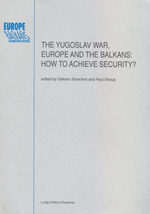and Balkan Europe
by IECOB & AIS Università di Bologna

This area collects information about a wide range of books, monographies and edited volumes concerning the countries and themes relevant to PECOB
The Yugoslav War, Europe and the Balkans: How to Achieve Security?
edited by: Stefano Bianchini and Paul Shoup
published by: A. Longo Editore
pp: 192
ISBN: 88-8063-063-6
price: € 15.49

After more than four years of war in the former Yugoslavia, it has become clear that ethnic conflicts in the Balkans will continue to challenge Europe well into the next decade and beyond. The thread that runs through all the chapters of this book is that of a deeply troubled region whose dysfunctionalities are largely, but not exclusively, the product of the history of Southeastern Europe and the conditions under which Yugoslavia disintegrated after 1989.
The value of these essays lies in their illustration of the variety of ways in which these dysfunctionalities have expressed themselves: in the 'Balkanization of Europe'; in the 'instability arc' stretching from the Balkans to Southern Russia and Central Asia; in the cultural discontinuities between Central Europe and the Levant; and in the quasi-colonial status of Bosnia-Herzegovina prior to her independence. Last but not least, several of the authors deal with the rise of bureaucratic nationalism in Serbia.
What, then, can be done to promote stability and security in Southeastern Europe? Virtually all of the authors of this volume, despite their differences in approach, reject the view that the conflict in former Yugoslavia is purely a local problem resulting from the peculiarities of the Balkan mentality. On the contrary, they see the crisis in terms of the broader challenge of sustaining liberal values and a civic culture at a time when the struggle against communism no longer serves to unite Europe and the West.
Hopefully, the essays collected here will help to focus attention on the scope of the problem and the obstacles that must be overcome if stability and security are to be realized over the longer term in this strategically vital part of the world.
Chapter-by-chapter
Paul Shoup, Introduction
Part One - In Search of a New Geopolitical Balance in Former Yugoslavia
Stefano Bianchini, The Collapse of Yugoslavia: Sources of Its Internal Instability
Carl-Ulrik Schierup, Eurobalkanism. Ethnic Cleansing and the Post-Cold War Order
Zarko Papić, Dictatorship. War, and Democracy in Former Yugoslavia
Paul Shoup, Civil Society, the Stale and the War in Bosnia: Some Observations
Dušan Janjič, Serbia Between the Past and the Future
Il'ja Levin, "Neopanslavism": Mutuality in the Russian-Serbian Relationship
Jože Pirjevec, The Levant and Central Europe in the History of Former Yugoslavia
Loredana Bogliun Debeljuh, The Istrian Euroregion. Socio-Cultural Situation and Problems
Part Two - How to Guarantee National Security in the Balkans
George Schőpflin, Civil Society and Nationhood
Hákan Wiberg, Security and Identity in Former Yugoslavia
Mario Zucconi, The Legacy of the "Gray Area "
Alla A. Jaz'kova, Regional Integration Processes and the Problem of Security in the Balkans
Luigi Vittorio Ferraris, Contemporary Italy and the Balkan Crisis
Albert Bininašvili, Turkey and the Balkans in the 1990s
Zarko Puhovski, Is a Post-Yugoslav Peace Possible?
Stefano Bianchini, Conclusions








